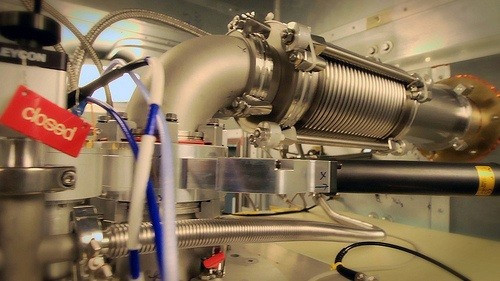Technology Focus: Does Big Bucks Research Pay the Right Dividend?

One day earlier this year, a group of IBM (NYSE: IBM) researchers proved for a millisecond that quantum computing is feasible. That experiment proved there will be quantum computers within our lifetime, IBM's Manager of Physics of Information said last week.
That researcher, physicist Mark Ketchen, and other members of the team must have felt somewhat like another group of physicists at Chicago's Stagg Field in December 1942, when they achieved the first self-sustaining chain reaction.
The goal of the IBM experiments was to prove that theoretical beliefs can be made to work. Quantum computing - the 21st century's leap over the 20th century's invention of computing - is similar. Rather than using the 1's and 0's of all contemporary computing, the theory says so-called quantum bits, or qubits, could be made to work using superconductivity.
Before long, the IBM researchers said, it will. For sure, similar work is proceeding in universities (Yale research contributed to the IBM work) as well as in corporate labs.
Of course, it doesn't hurt that IBM invested $6.26 billion, or nearly 6 percent of total revenue, on research and development last year. The company was awarded a record 6,180 patents, quadruple those of bigger rival Hewlett-Packard and six times those of Oracle.
To be sure, those Silicon Valley giants didn't slouch. In its year ended last October, HP spent about $3.3 billion, or about 2.6 of revenue, on R&D; Oracle spent about 1 percent of revenue in its first half ended Nov. 30.
The figures don't necessarily prove IBM gets more bang for the buck. In 1992, IBM almost went bankrupt due to poor management. Its recovery has been the result of a skilled match of focused research matched with customer services. That's why billionaire Warren E. Buffett is a new major shareholder.
One thing that stands out is that only one more U.S. company ranks among the top 10: Microsoft, which won 2,311 patents last year. The remainder? Samsung Electronics, Canon, Panasonic, Toshiba, Sony, Seiko Epson, Hon Hai and Hitachi.
These are all great companies but one might wonder why more U.S. companies don't make the grade. When quantum computing, albeit at supercold temperatures with new physics, becomes a viable technology, will IBM be working with Samsung and Toshiba or with Intel, Freescale and Texas Instruments?
In a sense, it's astonishing that IBM still maintains a corporate laboratory. Few large U.S. companies retain them, like General Electric and DuPont, as well as HP. Roland Schmitt, once GE's chief scientist, used to tell visitors his job was to devise good new ideas for GE to commercialize.
With the possible exception of Israel, the U.S. is the only country with a thriving venture capital sector that takes risks in new ideas and companies and stakes them until they can be sold or taken public. Intel, the biggest chipmaker, is a good example. Last week, it put $100 million into a smart cars initiative, bringing investments of its Intel Capital unit above $10.5 billion.
By the time quantum computing becomes viable, you can be sure that some venture capital-backed company will have done essential research that attracts an IBM or HP or Oracle, if they haven't done the work internally.
Last year, the National Venture Capital Association reports, $2.3 billion was invested in 551 companies, a 15 percent increase from 2010. Software companies received 38 percent of the funds.
Chances are that the tech players, venture capitalists and capital markets will be around to fund new ideas and that there will periodically be disrupters like Steve Jobs, Larry Page and Sergey Brin to merit their bucks.
© Copyright IBTimes 2025. All rights reserved.






















